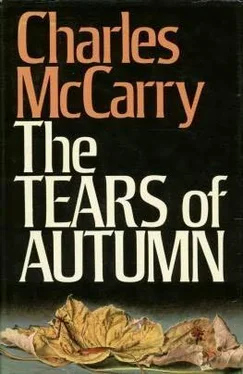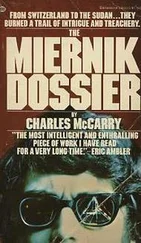“Yes, the geomantic factors. You understand the principle of geomancy, of course-one orients oneself to the natural world on the basis of harmony with the five natural elements, which are fire, water, metal, wood, and earth. None of these three men seems to have been in harmony with the world. In Vietnamese terms, they were all under the influence of the Ma Than Vong.”
“Which is?”
“A very colorful and malevolent force-the tightening-knot ghost. Ma Than Vong goads men to suicide, or into situations where their violent death is inevitable. One of the men, this one-a foreigner, I believe-am I correct?”
Christopher nodded. Yu Lung had shown him Kennedy’s horoscope.
“The foreigner was a powerful man,” Yu Lung said, “but his particular nemesis was Ma A Phien, whom the Vietnamese call the opium ghost. This man was predisposed to a death in the pleasures. Also, he was much involved with the am, the female spirit that stands for darkness and is associated with death. As for the others, who must be Vietnamese, there was a long period of the influence of duong, or the male spirit of light, or life. Then this force conjoins with the am spirit of the other man, and they are lost.”
“By whose error?”
“Their own, of course. As I said, we are dealing with predisposition, not predetermination. The horoscope is incomplete, as you must realize.”
“Incomplete? In what way?”
“There are other individuals involved. One in particular, who I could guess is a Vietnamese related in some way to the other two. Perhaps he lives elsewhere than in the place where his two relatives live, or lived. He exerts a force after their death. It’s a key force. Without knowing his stars, you will not understand the others.”
Yu Lung rocked back in his swivel chair with a faint squeal of metal springs and folded his hands on his stomach. “Would you care for some tea,” he asked, “or a glass of scotch whiskey?” Yu Lung’s face was circular like his charts-a small pursed mouth, a broad nose that moved when he smiled, arched eyebrows.
“It’s the other man in whom I am interested,” Christopher said.
Yu Lung laughed. “I thought it might be. You haven’t the look of a man who pays five hundred dollars out of idle curiosity.” He pulled Scotch tape from a dispenser and stuck the torn American bills together. “Have you chosen between tea and scotch?” he asked.
“Nothing, thank you. I may say you work swiftly from very limited information.”
Yu Lung shrugged. “It’s a settled science. One learns the principles, and if one has the gift, the situation opens itself very quickly.”
“One would almost think that you had dealt with these particular horoscopes before.”
“Ah, perhaps,” Yu Lung said. “They are unique. All horoscopes are.”
“Then you’d remember if you had done them before?”
“Yes, I’d remember. You say you are a friend of Lê Thu. How did you come by that name?”
“By chance,” Christopher said, “though I suppose your philosophy would not accept that explanation.”
Yu Lung waved a pudgy hand. “Chance is an accurate word in your language. A geomancer would call it the function of feng shut -the geomantic conditions. What you’d describe as being in the right place at the right time. These beliefs are ancient. Your people once held to them, like everyone else. They’re preserved in your language, though you no longer hear the real meanings in what you say.”
“You know something of Lê Thu, do you not?”
“I?” Yu Lung said. “It’s a common Vietnamese name, quite a sad one-they might give it to a second child if the first had died, in order to discourage the bad spirits from taking this child as well.”
“I was also a friend of Vuong Van Luong,” Christopher said. “I believe you spoke to him a couple of nights ago.”
“Luong. Yes, he came here.”
“And asked about Lê Thu.”
“I could tell him nothing of importance.”
“He was shot dead after he left you,” Christopher said.
“Not for that name, I think,” Yu Lung said. He had a habit of widening his eyes when he lied. He held Christopher’s money in his hands, counting it over and over again.
“What are the ethics of your profession?” Christopher asked. “Your consultations are secret, I suppose.”
“Oh, yes, absolutely. These are intimate matters.”
“Do you keep records?”
“Of course. Clients come back. One keeps a complete profile of the case. Principles are fixed, but conditions change. One wants to see how forces have behaved in the past, so as to apply their logic to the future.”
Christopher smiled at the man. “What is the maximum period of time over which a horoscope may be kept?”
“It’s quite indefinite, but of course one can compute in terms of an adult lifetime. Thirty years. Say ten thousand days -that has a certain ring to it.”
“I should think five thousand days would give one a complete picture.”
“Fairly complete. Not all, but enough.”
Christopher put a thick envelope on Yu Lung’s desk. The fortune-teller kept his eye away from it. He drew one of the horoscope sheets toward him. With a red pencil he drew circles around groups of ideograms that ran down the edge of the paper. “The system I use is uniform,” he said. “The top group is the date, place, time of birth. The next group is the name of the individual, if I have it. All the Chinese characters below are the description of the individual’s fate. Do you see?”
“Yes.”
Yu Lung straightened the pages, squaring their edges by tapping them on the glass top of his desk. He went to his file cabinet, unlocked it, and inserted the papers in a file so that a corner protruded from the top. Christopher’s envelope still lay on the desk top.
“And now,” Yu Lung said, “I must insist that you take a glass of scotch with me. It’s quite an extraordinary bottle of Chivas Regal. I had it from a foreigner. I’ll fetch it, if you’ll be so kind as to wait.”
Yu Lung left the room. Christopher took the file folder from the open drawer of the steel cabinet and opened it. There were seven sheets of drawing paper in addition to the ones Yu Lung had prepared for him. Christopher used Yu Lung’s scissors to clip the ideograms from the edges of all the sheets. He put the long strips of rice paper, covered with Yu Lung’s flowing calligraphy, in his inside pocket, with Molly’s photograph. He closed the file and pushed in the lock.
Yu Lung, when he returned with the whiskey, did not glance at the file cabinet. He handed Christopher his glass before he poured whiskey into it, and smiled when Christopher held the empty tumbler up to the light.
“Will you spoil it with ice?” he asked.
Christopher shook his head. They touched glasses.
“You’ve spent a good deal of time in the East,” Yu Lung said. “You’ve learned our manners-you don’t make sudden noises or laugh in that peculiar way Europeans have. They guffaw and stare at one, expecting that one will put on an expression that exactly matches their own. One is not, after all, a mirror.”
“Living in Saigon has not made you into a Vietnamese, Yu Lung.”
“No,” Yu Lung said, “though I was born here, like my father. We Chinese who live abroad call ourselves hua-chiao. The words mean ‘sojourning Chinese.’ A sojourn is by definition temporary. One of our poets said we are like migrating birds with our souls flying ahead of us to China; we take no interest in our landing places or even in our journey-we beat our wings violently, in pursuit of our souls. Vietnam is where I live, my dear fellow-but it is not my world.”
Yu Lung widened his eyes in self-mockery. “I think one glass of scotch is quite enough for me,” he said.
Читать дальше












